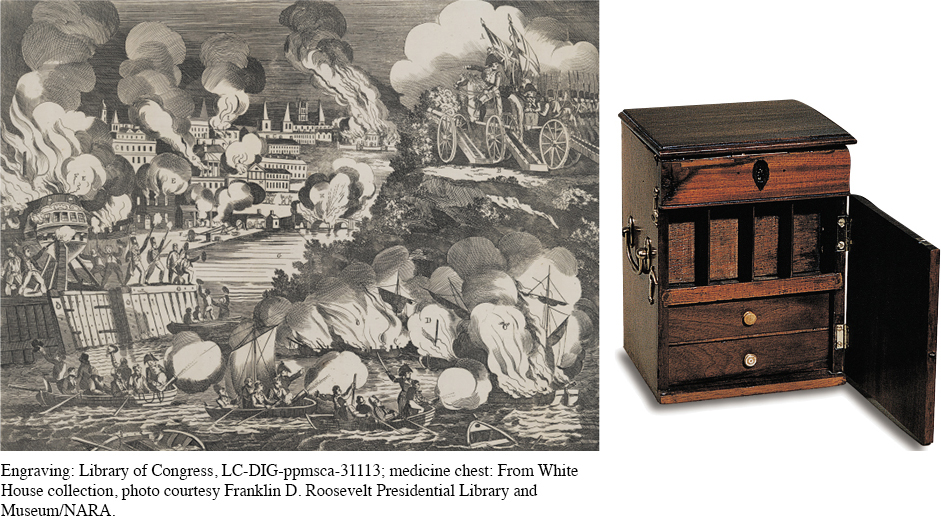The American Promise: Printed Page 267
The American Promise, Value Edition: Printed Page 247
The American Promise: A Concise History: Printed Page 279
Washington City Burns: The British Offensive
The American Promise: Printed Page 267
The American Promise, Value Edition: Printed Page 247
The American Promise: A Concise History: Printed Page 279
Page 267In August 1814, British ships sailed into Chesapeake Bay, landing 5,000 troops and throwing the capital into a panic. Families evacuated, banks hid their money, and government clerks carted away boxes of important papers. Dolley Madison, with dinner for guests cooking over the fire, fled with her husband’s papers, while servants rescued a portrait of George Washington. As the cook related, “When the British did arrive, they ate up the very dinner, and drank the wines, &c., that I had prepared for the President’s party.” Then the British torched the White House, the Capitol, a newspaper office, and a well-
In another powerful offensive that same month, British troops marched from Canada into New York State, but a series of mistakes cost them a naval skirmish at Plattsburgh on Lake Champlain, and they retreated to Canada. Five months later, another large British army landed in lower Louisiana and, in early January 1815, encountered General Andrew Jackson and his militia just outside New Orleans. Jackson’s forces carried the day. The British suffered between 2,000 and 3,000 casualties, the Americans fewer than 80. Jackson instantly became known as the hero of the battle of New Orleans. No one in the United States knew that negotiators in Europe had signed a peace agreement two weeks earlier.

The Treaty of Ghent, signed in December 1814, settled few of the surface issues that had led to war. Neither country could claim victory, and no land changed hands. Instead, the treaty reflected a mutual agreement to give up certain goals. The Americans dropped their plea for an end to impressment, which in any case subsided as soon as Britain and France ended their war in 1815. They also gave up any claim to Canada. The British agreed to stop all aid to the Indians. Nothing was said about shipping rights. The most concrete result was a plan for a future commission to determine the exact boundary between the United States and Canada.
Antiwar Federalists in New England could not gloat over the war’s ambiguous conclusion because of an ill-
The American Promise: Printed Page 267
The American Promise, Value Edition: Printed Page 247
The American Promise: A Concise History: Printed Page 279
Page 269No one really won the War of 1812; however, Americans celebrated as though they had, with parades and fireworks. The war gave rise to a new spirit of nationalism. The paranoia over British tyranny evident in the 1812 declaration of war was laid to rest, replaced by pride in a more equal relationship with the old mother country. Indeed, in 1817 the two countries signed the Rush-
The biggest winners in the War of 1812 were the young men, once called War Hawks, who took up the banner of the Republican Party and carried it in new, expansive directions. These young politicians favored trade, western expansion, internal improvements, and the energetic development of new economic markets. The biggest losers of the war were the Indians. Tecumseh was dead, his brother the Prophet was discredited, the prospects of an Indian confederacy were dashed, the Creek’s large homeland was seized, and the British protectors were gone.
The American Promise: Printed Page 267
The American Promise, Value Edition: Printed Page 247
The American Promise: A Concise History: Printed Page 279
Page 270REVIEW Why did Congress declare war on Great Britain in 1812?